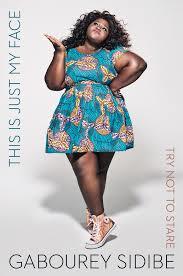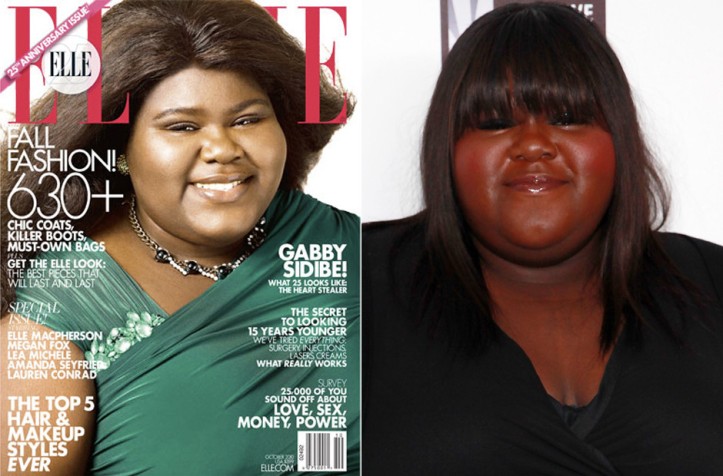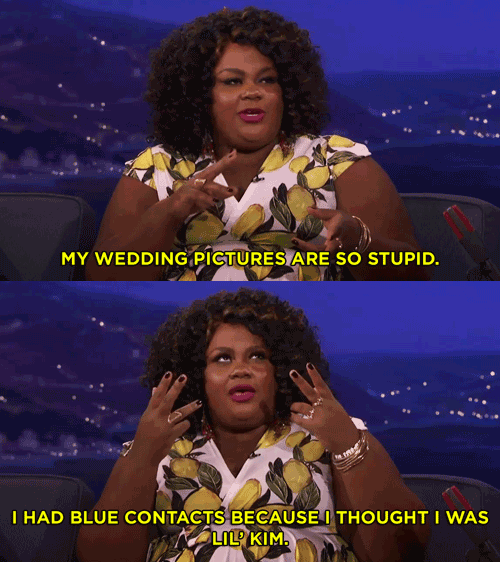
I pre-ordered This is Just My Face: Try Not to Stare by Gabourey Sidibe for my Reading Fat Women Challenge. It was published in May 2017, but I’m not worried this memoir sat on my shelf for a little while because it’s important to support authors as soon as possible. Sidibe’s most famous for her first role as Precious in the Lee Daniel’s movie of the same title — she was 24. She’s also been in Empire and American Horror Story: Coven, neither of which I’ve seen.
The memoir opens strong when Sidibe gives a glimpse of the culture of celebrity. She’s headed to Lee Daniel’s office because she’s been asked to appear on the cover of Vogue, when she overhears him on the phone with André Leon Talley, the editor-at-large of the magazine. She overhears a horrible conversation:
“You hear me, Lee? I’m putting that fat bitch right on the cover of Vogue. I love her. That black bitch WILL be on the cover!” André yelled.
“YES!!!! She is EVERYTHING!” Lee screeched in agreement.
Sidibe acknowledges that Talley is also a fat black person in an attempt to forgive the comments. Although 24 isn’t a child, Sidibe comes from a background that makes her vulnerable, and I worried for her immediately. I thought this was the depth the memoir would have throughout.

This is Just My Face moves on to the actor’s childhood, which sounded, well, childish. Sidibe grew up in Harlem, was born Muslim, and her parents got married so her dad could get a green card. She paints her father poorly long before giving evidence for her feelings:
He’s African, so he has an accent. African is another word I use to describe his personality. African, cabdriver, boring.
Already, because she’s given such a vague image of her Senegalese father, she’s reinforced stereotypes about certain immigrants. He is a petty man, but Sidibe skips over moments that she could analyze. She only mentions how there was a time when her father told child protective services that their mother was abusing them to punish the mother. Sidibe and her brother were put in a foster home as a result, which was not their father’s intent. Very little is said about this. Instead, Sidibe sounds mad, like she’s crossed her arms and is pouting. Though she has a right to be upset, her tone and writing style don’t covey the depth of the situation.
At first, I thought the author sounded petulant because I was reading about her childhood and teen years, but she’s 35 today. If you go back a few years to when she would be writing this book, you have a rather young author, one who isn’t removed enough from her experiences to analyze them, to turn them around in her hands.
For example, Sidibe insists she’s funny, and when she writes funny things on Twitter, a lot of people don’t get her. This is one of her jokes:
Seriously! What the fuck is James Franco’s deal?! I’m sick of it, James! SICK OF IT!
Have you ever had someone say something mean to you, but when you didn’t laugh they said in a somewhat threatening tone, “I’M JUST JOKING.” Uh, no you weren’t. Sidibe writes “jokes” like that. As comedian Nicole Byer would say on her podcast Why Won’t You Date Me?, I don’t think Sidibe understands the structure of a joke.

About 75% of the way through the book, she complains that her immediate and extended family want money from her. She gives it to the extended family and pays for her parents’ rent. This is the epitome of childish to me: doing something she doesn’t have to do and then complaining about it behind her family’s back.
One positive in This is Just My Face was when Sidibe admitted she wrote fan fiction as a teen and continued for years. She included the guys from *NSYNC in 13 seasons of TV shows that she wrote and showed no one. Sometimes they were famous, but sometimes the guys and Sidibe were in the same high school. It was rewriting her life into TV episodes that allowed the actor to fix her own life in her head.
And not only did her fan fiction endear me to her, but it gave evidence of the problems in her family that she didn’t explore in her memoir: her father’s polygamy, her mother’s job as a subway singer, the money issues that arose from of her parents’ occupations, her inability to finish college, her family’s insistence that she lose weight and be a pretty girl, and her immediate rejection of Islam.
For those looking for a positive representation of a fat woman, I’m not sure this is the book. Sidibe claims to love her body, but she also discusses diabetes casually and undergoes weight-loss surgery. Although every individual body is only the owner’s business, many fat-positive activists caution against weight-loss surgery as a mechanism to mutilate fat people in the name of happiness, with some medical professionals even touting cures to health issues the fat person may not have, like diabetes or high blood pressure.
Overall, Sidibe’s book is simplistic, jumps around, and tries to be hip. I felt it would be a good read for teenagers, though she does use strong language, as evidenced above. Here’s an example of her tone throughout:
I block people [on Twitter] who don’t like my hair. I block people who Tweet that they don’t like my blonde hair on Empire. Hi! Empire is a TV show! I didn’t get to choose my character’s hair color, but it’s my job to wear it. I can’t do anything about it. You can do even less about it cuz ya blocked! Oh! You think I shouldn’t wear red? I LOVE wearing red! Don’t worry. You won’t see me wear read cuz YA BLOCKED!
Doesn’t that just scream teen or early 20s? I didn’t enjoy my reading experience.

I’m sorry to hear you didn’t enjoy this one, although I understand your reasons why. It sounds as though there could have been much more depth to it than what you found. I’m with you on the fan fiction, though. That sounds interesting!
LikeLike
Perhaps there should be a general rule: no one can write and publish books about their childhood until they are 40.
LikeLiked by 2 people
Probably. Or at least have some sort of heavy mentorship or editorial staff involvement if you’re writing a memoir that young. I will admit, I enjoyed reading Scrappy Little Nobody by Anna Kendrick; it was published when she was 31 and certainly written when she was younger. I didn’t expect anything particularly deep and the writing style was… nothing like the examples above.
LikeLike
If I had to read another memoir by a younger person, I would choose Nicole Byer from Nailed It!, and I would want! her! to! write! how! she! taaaAAAAAaaaaalks!
LikeLiked by 1 person
What’s that? I just spent my whole lunch hour watching episodes of Nailed It!? Yes. Yes. I did. Nicole Byer is my new favorite celebrity. Is she even a celebrity? She is now. In my mind. ❤ ❤ ❤
LikeLike
She considers herself mildly successful. I’ve also listened to, like, 30 hours of her podcast.
LikeLiked by 1 person
30 hours is not a small amount of time. Any episodes you’d recommend for a quality introduction? I don’t listen to many podcasts, but I’m not afraid to start trying! 🙂
LikeLike
Oh what a shame – sounds like she could have done with some guidance from someone while writing the book. A good opportunity to be a role model and say some interesting things looks to have been lost here.
LikeLike
She has a unique life that says something about growing up the child of an immigrant–if only she’d focused on that. Although I picked up this book because I wanted to support a fat actress, she almost suggests she fell into acting. She participated in small college theater before being cast in Precious — and not much.
LikeLike
Oh dear. I’m not a fan of that style of writing. There are a lot of memoirs I don’t read, because I worry about that type of thing. Like Liz said, it seems to be a missed opportunity. Maybe she’ll write another book in a decade or two…
LikeLike
It’s written like a teen’s diary; majorly cringe-worthy. I wasn’t a fan of the style of writing, either. I feel like most YA novels I’ve read are more mature.
LikeLiked by 1 person
The last excerpt you’ve quoted from her book is total cringe-worthy.
Unfortunately, I got introduced to Gabourey Sidibe through some mean memes spun around her and from thereon, she has become one of my favorite body-positive icons.
It’s a shame that her memoir could’ve been so much better and in-depth under right guidance.
LikeLike
Hello, and thanks for stopping by my blog! People love to hate on fat people, definitely fat women, and especially fat black women. This is one of the reasons I’ve grown to love Nicole Byer so much. If you have Netflix, you should watch Nailed It!
LikeLike
Sigh. Another fat representation book which failed the test. I love that your Fat Reading Goals page lists all the books on your TBR by genre, but I’d also love to see a list by recommendation level. Highly Recommended, Hesitantly Recommended, Not Recommended. Reading your thoughts on This is Just My Face, drove me to see out what percentage of the books you’ve read thus far actually met your criteria. It’s hard to easily see.
Anyway. About this book. It sounds like Sidibe is just trying too hard to be hip. In all aspects of her life. The excerpts you shared come across as forced to me. Perhaps something is lost not knowing anything about her personality?
LikeLike
I wonder how I could rearrange my page. It seems like a lot of people want a certain type of book, which is why I have it as I do. I also know that page is ginormous.
LikeLiked by 1 person
Hahaha. It is! But in a good way. There must be a way to make it easier for find information… I cannot access my WP dashboard right now (because of course), but I wonder if you could create anchors so there is a table of contents at the beginning? Or perhaps an icon or color or something to call our the Highly Recommended books? *shrugs* I’ll continue to ponder.
LikeLike
Those are great ideas! I’m going to look at those options tomorrow!
LikeLiked by 1 person
OH MAN! You completely revamped that page! I love all the photos on the main page and how you broke everything up by genre. Honestly, I feel like this drives a stronger conversation because how often do we think of themes in literature crossing genres? Well, when we aren’t English teachers. XD The break down by genre also makes the lists less overwhelming.
One finally suggestion – take it or leave it — how about listing your “Must Reads” on the main Reading Fat Women page? This could incite people to pick up texts with less work overall. #UsabilityIsMyJob
LikeLike
That is a really good idea! I tried color coding them (red/green), but it looked like something from geocities.
LikeLiked by 1 person
Ew. Geocities.
…
I wonder if my 7th grade science biome project is still on Geocities. Probably. XD
LikeLike
OMG, you have to look! 🤣
LikeLiked by 1 person
Honestly, I wouldn’t even know where to start Googling that. “Tropical Rainforest 7th grade science project” ?
LikeLike
JACKIE’S tropical rainforest 7th grade science project.
LikeLiked by 1 person
Sounds utterly dire! I’m not sure I ever sounded that immature even when I was three. Dear me, the rubbish that gets published – makes me grieve for the wasted trees… 😉
LikeLike
Sigh-that is a shame. I echo FF’s comments above LOL
I wonder what the editors were thinking when they were working on her book. Probably the same thing they think when they work on every celebrity’s book that’s horribly written-FML 🙂
LikeLike
I’m just curious about who the intended audience is. Maybe college-age young women?
LikeLiked by 1 person
perhaps? or even younger?
LikeLike
If she’s written good and in-depth stuff elsewhere, as you say then perhaps she just knocked this out for the fans and didn’t get it right. I wonder if it sells anyway, just not to people who read actual literature.
LikeLike
That’s a good question. I haven’t heard of her writing anything else that was published.
LikeLike
Sorry this ended up not being an enjoyable read for you. My takeaway from your review is that maybe a memoir at this time in her life wasn’t the best time. It sounds like their is a real lack of maturity in her voice.
LikeLike
Definitely. I have two memoirs planned for this month, but I believe they are both a bit older. Irby is mid to late 30s. I’m not sure about the Detroit Hustle author, but she’s married, got a house, renovated it. She’s got to be a bit older, close to 40.
LikeLiked by 1 person
Great review but sad to see the book didn’t really seem to have much substance. I can empathize with her childhood but you make a great point that she wasn’t far enough removed from her hurt and anger to analyze the situation and her feelings about them. Perhaps if he had some encouragement from a trusted confidant and friend, maybe they would have advised her to take an introspective look. Or MAYBE she wanted this voice to be heard in the context of her life at that time. Maybe someone younger, as you said, might find it relatable, but based on your comments this is one I’ll pass on.
LikeLike
Hey, Shell! You make a good point about capturing the voice of her at that age. As far as a trusted loved one to read the manuscript, well, she almost implies she doesn’t have a trusted loved one, which makes me sad. I’m reminded of Jenny Lawson, whose first memoir is very good (Let’s Pretend This Never Happened), but her second is even better because her husband pushed her to dig deeper into her feelings and reactions (she writes about this in Furiously Happy).
LikeLike
Yikes this sounds terrible. Unfortunately, this is usually how I see celebrity memoirs turning out. I haven’t really found any that sound that interesting.
LikeLike
Even the Joan Fontaine autobiography I read just recently was whiney. OMG. Ami. It’s a celebrity thing, and I didn’t realize! 😲 I don’t typically reach for celebrity memoirs!
LikeLike
This sounded like a disappointment 😦 It doesn’t sound like her fatness was a big part of the book? I guess I assumed that a good portion of the book would be about what it is like to be a fat celebrity and the challenges she’s had to overcome. That first part about overhearing André Leon Talley’s horrible comment was terrible! Like he was celebrating the fact his was allowing a fat person to be on the cover of a magazine? What a terrible person.
LikeLike
He’s also a gay man, so I wondered if he’s part of that culture that calls all women “bitch” and assume it’s a fun nickname that women don’t mind because the user is not a straight man. Sidibe does talk about being a fat celebrity, but she’s also do young that she doesn’t have years of experience as a celebrity like other women who write memoirs about their bodies. She dances between shame and not caring, so I don’t think she’s really studied the fat positive movement.
LikeLiked by 1 person